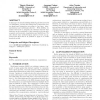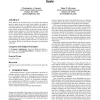803 search results - page 13 / 161 » Game Theory and Decision Theory in Multi-Agent Systems |
ICC
2007
IEEE
14 years 2 months ago
2007
IEEE
—Recently, game theory becomes a useful and powerful tool to research mobile ad hoc networks (MANETs). Wireless LANs (WLANs) can work under both infrastructure and ad hoc modes, ...
ATAL
2009
Springer
14 years 2 months ago
2009
Springer
In this paper we describe MASQ (Multi-Agent Systems based on Quadrants), a model that defines four perspectives over an agent-based interaction according to two axes: internal/ex...
ATAL
2007
Springer
14 years 2 months ago
2007
Springer
Agents engaged in noncooperative interaction may seek to achieve a Nash equilibrium; this requires that agents be aware of others’ rewards. Misinformation about rewards leads to...
ACMICEC
2007
ACM
13 years 12 months ago
2007
ACM
While diffusion of innovation topics in economics and majority games in game theory have been widely studied, the impact of economy-of-scale effects in aggregated decision making ...
WICON
2008
13 years 9 months ago
2008
Much previous work has examined the wireless power control problem using tools from game theory, an economic concept which describes the behavior of interdependent but non-coopera...


